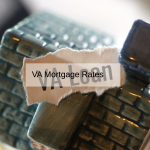VA loans are a valuable benefit for veterans, active-duty service members, and eligible spouses. One of the key factors to consider when getting a VA loan is the mortgage rate. Understanding how VA mortgage rates work can help you make informed decisions and secure the best deal for your home purchase.
What are VA Mortgage Rates?
VA mortgage rates are the interest rates offered on VA loans. These rates determine the amount of interest you'll pay over the life of the loan. VA rates are typically lower than conventional mortgage rates, making VA loans an attractive option for eligible borrowers.
Factors Influencing VA Mortgage Rates
Several factors influence VA mortgage rates, including:
- Current economic conditions: VA rates are influenced by factors such as inflation, economic growth, and the Federal Reserve's monetary policy.
- Market trends: Mortgage rates can fluctuate based on supply and demand in the housing market.
- Credit score and financial history: Borrowers with higher credit scores and stronger financial histories may qualify for lower VA rates.
Types of VA Mortgage Rates
There are two main types of VA mortgage loans rates:
- Fixed-rate VA loans: These loans have a fixed interest rate for the entire term of the loan, providing predictability in monthly payments.
- Adjustable-rate VA loans (ARMs): ARMs have a fixed interest rate for a specified period, after which the rate adjusts periodically based on market conditions.
Benefits of VA Mortgage Rates
VA mortgage rates offer several benefits, including:
- Lower interest rates: VA loans typically have lower interest rates compared to conventional loans, saving borrowers money over time.
- No down payment requirements: Eligible borrowers can purchase a home without having to make a down payment, reducing upfront costs.
- Flexible credit requirements: VA loans may be more accessible to borrowers with less-than-perfect credit, making homeownership more attainable.
How to Qualify for the Best VA Mortgage Rates
To qualify for the best mortgage loan rates, you can:
- Meet VA loan eligibility requirements: Ensure you meet the VA's service requirements and other eligibility criteria.
- Improve your credit score: Work on improving your credit score to qualify for lower rates.
- Work with a VA-approved lender: Choose a lender experienced in VA loans who can offer competitive rates and terms.
Compare Mortgage Lenders Side by Side
Learn how to effectively compare mortgage loan lenders, weighing factors such as rates, fees, customer service, and reputation to find your ideal partner.
Some of Best Mortgage Lenders in the USA
- Quicken Loans - Known for their excellent customer service and fast loan processing times.
- Wells Fargo - Offers a wide range of mortgage products and has a strong presence nationwide.
- Chase Bank - Provides competitive rates and a variety of loan options to suit different needs.
- Bank of America - Offers competitive rates and has a strong online presence for easy access to mortgage information.
- US Bank - Known for their personalized service and flexible loan options.
- Rocket Mortgage - Offers a completely online mortgage application process for convenience.
- Veterans United Home Loans - Specializes in VA loans and provides exceptional service to veterans and active-duty service members.
- CitiMortgage - Offers competitive rates and a variety of loan options for homebuyers.
- SunTrust - Known for their flexible loan terms and excellent customer service.
- Freedom Mortgage - Offers a variety of loan options and specializes in helping first-time homebuyers.
- PennyMac - Known for their competitive rates and efficient loan processing.
- Guild Mortgage - Offers personalized service and a wide range of loan options for homebuyers.
Understanding VA Mortgage Rate Quotes
When comparing VA mortgage rate quotes, pay attention to:
- Interest rate: The rate of interest charged on the loan.
- APR: The annual percentage rate, which includes the interest rate and other loan fees.
- Loan term: The length of time over which you'll repay the loan.
Factors That Determine Your Mortgage Rate
Gain insights into the various factors that influence your mortgage loan rate, including creditworthiness, loan amount, down payment, and market conditions.
How to Refinance Your Current Mortgage
Navigate the refinancing process with confidence, from assessing your financial situation to choosing the right refinance option and lender.
How to Get the Best Mortgage Rate
Unlock insider tips and strategies to secure the best mortgage rate, from improving your credit score to shopping around and negotiating with lenders.
Understanding VA mortgage rates is crucial for anyone considering a VA loan. By knowing how these rates work and what factors influence them, you can make informed decisions about your home purchase. Be sure to explore your options and work with a knowledgeable lender to secure the best VA mortgage rate for your situation.
FAQs
Q: How do VA mortgage rates compare to conventional rates?
VA mortgage rates are often lower than conventional rates. This is because VA loans are guaranteed by the Department of Veterans Affairs, which reduces the risk for lenders. As a result, lenders can offer lower rates to VA borrowers compared to conventional borrowers.
Q: Can I refinance my VA loan to get a lower rate?
Yes, you can refinance your VA loan to get a lower rate through a VA Interest Rate Reduction Refinance Loan (IRRRL) or a VA cash-out refinance. An IRRRL allows you to refinance your existing VA loan into a new VA loan with a lower interest rate. A VA cash-out refinance allows you to refinance your existing VA loan and take out cash from the equity in your home.
Q: What fees are included in VA mortgage rates?
VA mortgage rates typically include the interest rate charged on the loan and may also include other fees, such as origination fees, appraisal fees, and closing costs. It's essential to review the loan estimate provided by your lender to understand all the fees associated with your VA loan.
Q: Are VA mortgage rates fixed or adjustable?
VA mortgage rates can be either fixed or adjustable. Fixed-rate VA loans have a fixed interest rate for the entire term of the loan, providing predictability in monthly payments. Adjustable-rate VA loans (ARMs) have a fixed interest rate for a specified period, after which the rate adjusts periodically based on market conditions.
Q: Can I refinance my VA loan to get a lower rate?
Yes, you can refinance your VA loan to take advantage of lower rates. This is known as a VA Interest Rate Reduction Refinance Loan (IRRRL) or streamline refinance. It allows you to refinance your existing VA loan into a new loan with a lower interest rate.
Q: What fees are included in VA mortgage rates?
VA mortgage rates include the interest rate charged on the loan. They may also include other fees, such as origination fees, closing costs, and discount points. It's essential to understand all the fees associated with your loan to ensure you're getting the best deal.
Q: How can I lock in a low VA mortgage rate?
To lock in a low VA mortgage rate, you can work with a lender to secure a rate lock. A rate lock guarantees you a specific interest rate for a set period, typically 30 to 60 days. This protects you from rate increases while you complete the loan process.
Q: Are VA mortgage rates the same for all borrowers?
No, VA mortgage rates can vary depending on factors such as credit score, financial history, and loan term. Borrowers with higher credit scores and stronger financial profiles may qualify for lower rates than those with lower scores or less favorable financial histories.
Q: Can I negotiate my VA mortgage rate?
Yes, you can negotiate your VA mortgage rate with lenders. It's a good idea to shop around and compare rates from multiple lenders to ensure you're getting the best deal. You can also ask lenders if they offer any discounts or special promotions that could lower your rate.
Q: What should I do if I'm having trouble paying my VA mortgage?
If you're having trouble paying your VA mortgage, contact your loan servicer immediately. They may be able to offer assistance, such as a loan modification or repayment plan, to help you avoid foreclosure. It's essential to act quickly to address any financial difficulties and protect your home.














